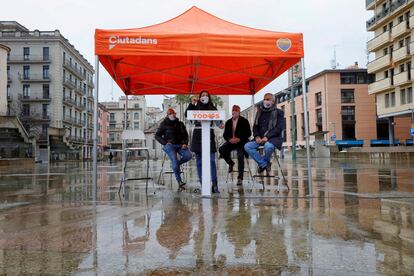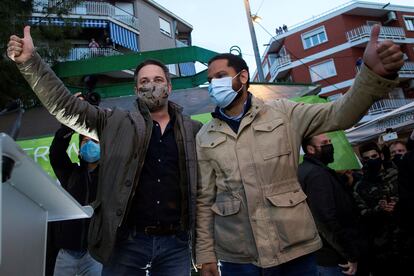Spain’s far right gains ground ahead of Catalan regional election
Ciudadanos won the most votes at the last poll but is losing support to Vox, which has copied its hardline stance against the independence movement


The upcoming election in Catalonia on February 14 is poised to change the political landscape of the northeastern region. At the last regional poll in 2017, the center-right party Ciudadanos received the highest number of votes, but did not win enough seats to form a government. Two pro-Catalan independence parties, Junts per Catalunya (Together for Catalonia) and the Catalan Republican Left (ERC), with the support of the anti-capitalist party CUP, instead joined forces to take office.
But four years on, the situation has changed dramatically. The most striking difference is that this year the far-right party Vox is set to enter the Catalan parliament for the first time. Vox is gaining in the polls by using the same strategy that made Ciudadanos the most-voted party in 2017 – taking a hardline stance against the pro-independence movement. Last Wednesday, on the news program Els Matins, Vox’s candidate for premier, Ignacio Garriga, threatened to close down TV3, Catalonia’s public television channel, “for being a means of manipulation.” In 2018, the then-leader of Ciudadanos, Albert Rivera, made the same threats. On Saturday, around 50 protesters demonstrated at a Vox event in the city of Vic, throwing rocks, eggs, beer cans and packets of flour at Garriga and Vox general secretary Javier Ortega Smith. The situation had echoes of a similar protest two years ago when Inés Arrimadas, now the national leader of Ciudadanos, was insulted and jeered. The story is the same, but the protagonists are different. Now it is Vox that is leading the campaign for the political right, while Ciudadanos is desperately searching for a way to stop their advance.

It is not an easy task. On the one hand, Ciudadanos wants to stop its voters switching their allegiances to Vox, but on the other, it does not want to lose support to the Catalan Socialists (PSC) – the Catalan branch of the Socialist Party (PSOE). Polls indicate that the PSC could make significant gains at the regional election, thanks largely to the popularity of the party’s candidate for premier, Salvador Illa, who rose to the limelight as national health minister during the coronavirus pandemic, a role he stepped down from in order to stand for election. While Ciudadanos’ campaign began with a softer approach under the slogan “vote for hugs,” it has since taken a much tougher position against the separatist movement. In one video, the party compared pro-independence protests to the recent siege of the Capitol building in the United States.
But the strategy does not appear to be working. Ciudadanos candidate for premier Carlos Carrizosa and Arrimadas changed their plans on Sunday and went to Girona, a stronghold of the pro-independence movement, where the ERC had also organized an event, featuring Arnaldo Otegi, the coordinator of the Basque nationalist party EH Bildu. All of Ciudadanos events are held without a public as a coronavirus safety measures, and instead live streamed via social media. Nevertheless, the lonely event in a rainy Girona could not have been more dispiriting. No one even came out to boo them.
The conservative Popular Party (PP) is not faring much better. Its campaign has been clouded by a new trial, which began Monday, into the party’s alleged illegal funding. Last Thursday, ahead of the trial, former PP treasurer Luis Bárcenas, who is serving a 29-year sentence over a sweeping graft case known as Gürtel, sent a letter to prosecutors in which he promised to name senior party officials who allegedly accepted regular payments of undeclared money. Since then, all news about the PP has been related to corruption, despite claims from PP candidate Alejandro Fernández that “the PP is not Bárcenas.”
A Ciudadanos video comparing pro-independence protests to assault on US Capitol (Spanish audio).
On Sunday, PP leaders had to come out to deny allegations that the party offered to negotiate with Bárcenas in order to “bury the hatchet,” as the former treasurer claimed in an interview with Spanish newspaper El Mundo. “The current national leadership of the Popular Party has never spoken with criminals,” said sources from the party. With time running out before the election, there are concerns within the party that the corruption scandal could hurt their results at the poll. The biggest concern is that Vox could win more votes than the PP come February 14.
In a bid to prevent this, the PP has focused its campaign on taxes and illegal squatters, known in Spain as okupas. But according to the polls, Vox continues to gain ground. Voter intention surveys show Vox on the rise, the PP plateauing and Ciudadanos in freefall. “Those who are against the independence movement in Catalonia are always going to vote for the party that makes the strongest stand. It is a broken society and half of it is humiliated and offended,” explains a former leader of Ciudadanos. Vox is trying to attract voters who are strongly opposed to the separatist drive with the same strategy of polarization that worked for Ciudadanos in 2017. The PP and Ciudadanos do not have much time to stop this advance: there is less than a week until they face off against Vox.
English version by Melissa Kitson.
Tu suscripción se está usando en otro dispositivo
¿Quieres añadir otro usuario a tu suscripción?
Si continúas leyendo en este dispositivo, no se podrá leer en el otro.
FlechaTu suscripción se está usando en otro dispositivo y solo puedes acceder a EL PAÍS desde un dispositivo a la vez.
Si quieres compartir tu cuenta, cambia tu suscripción a la modalidad Premium, así podrás añadir otro usuario. Cada uno accederá con su propia cuenta de email, lo que os permitirá personalizar vuestra experiencia en EL PAÍS.
¿Tienes una suscripción de empresa? Accede aquí para contratar más cuentas.
En el caso de no saber quién está usando tu cuenta, te recomendamos cambiar tu contraseña aquí.
Si decides continuar compartiendo tu cuenta, este mensaje se mostrará en tu dispositivo y en el de la otra persona que está usando tu cuenta de forma indefinida, afectando a tu experiencia de lectura. Puedes consultar aquí los términos y condiciones de la suscripción digital.








































